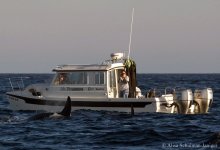The following is excerpted from this link:
https://wdfw.wa.gov/conservation/orca/v ... tions.html
Theses laws apply to a boat approaching whales. I couldn't find any laws restricting whales from approaching a boat.
The Washington Legislature passed a law (RCW 77.15.740) in 2008 placing legal restrictions on the activities of vessels near the whales... This law was updated in 2012 to correspond with current federal regulations. Violation of the law is a civil infraction that carries penalties of up to $1,025.
These regulations make it unlawful to:
Approach within 200 yards of a southern resident whale;
Position a vessel to be in the path of a southern resident whale at any point located within 400 yards of the whale. This includes intercepting a southern resident whale by positioning a vessel so that the prevailing wind or water current carries the vessel into the path of the whale at any point located within 400 yards of the whale. Vessels are defined as including aircraft, canoes, fishing vessels, kayaks, personal watercraft, rafts, recreational vessels, tour boats, whale watching boats, vessels engaged in whale watching activities, or other small craft including power boats and sailboats;
Fail to disengage the transmission of a vessel that is within 200 yards of a southern resident whale; or
Feed a southern resident whale.
Exemptions from the law exist as follow:
Persons operating a federal government vessel in the course of his or her official duties, or operating a state, tribal, or local government vessel when engaged in official duties involving law enforcement, search and rescue, or public safety;
Persons operating a vessel in conjunction with a vessel traffic service established under 33 C.F.R. and following a traffic separation scheme, or complying with a vessel traffic service measure of direction. This also includes support vessels escorting ships in the traffic lanes, such as tug boats;
Engaging in an activity, including scientific research, pursuant to a permit or other authorization from the National Marine Fisheries Service and Washington Department of Fish and Wildlife (WDFW);
Persons lawfully engaging in a treaty Indian or commercial fishery that is actively setting, retrieving, or closely tending fishing gear;
Persons conducting vessel operations necessary to avoid an imminent and serious threat to a person, vessel, or the environment, including when necessary for overall safety of navigation and to comply with state and federal navigation requirements; or
Persons engaging in rescue or clean-up efforts of a beached southern resident whale overseen, coordinated, or authorized by a volunteer stranding network.











